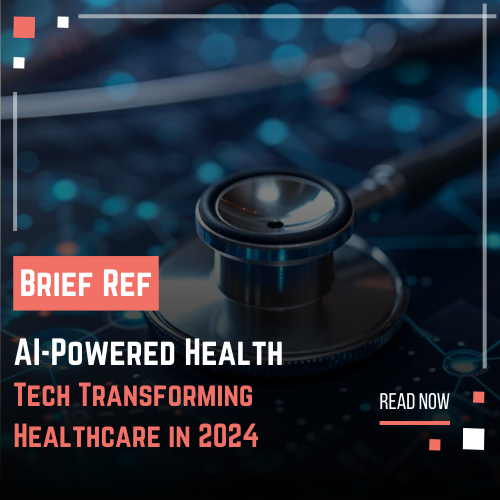Healthcare in 2024
As we move into 2024, artificial intelligence (AI) is revolutionizing multiple industries, with healthcare experiencing some of the most impactful transformations. AI-powered health tech is changing how we understand, diagnose, and treat medical conditions, driving significant improvements in patient outcomes and reshaping the future of medicine. In this article, we’ll explore the latest advancements in AI-powered health tech and how this emerging field promises to benefit patients, healthcare providers, and researchers alike.
Why AI in Health Tech?
AI in health tech brings data-driven efficiency and advanced analytical capabilities that help clinicians make faster, more accurate decisions. Whether it’s for diagnosing diseases, personalizing treatment plans, or predicting patient outcomes, AI in health tech offers transformative solutions that improve care quality and accessibility. AI algorithms can analyze complex medical data from sources like imaging, lab results, and genetic information, empowering healthcare professionals with a clearer understanding of a patient’s condition and potential risks.
Key Innovations in AI-Powered Health Tech
The influence of AI in health tech can be seen across various applications, from robotic surgeries to digital health assistants and predictive diagnostics. Let’s explore some of the most promising innovations that are pushing the boundaries of healthcare:
1. AI Diagnostics and Imaging
One of the most profound applications of AI-powered health tech is in diagnostics and imaging. AI can quickly analyze medical images like X-rays, MRIs, and CT scans to detect abnormalities with a high degree of accuracy. For instance, AI algorithms have proven particularly effective in detecting early signs of cancer, heart disease, and neurological disorders. These systems can often catch what human eyes might miss, leading to earlier and more precise diagnoses.
2. Robotic-Assisted Surgeries
AI-powered robots are now performing minimally invasive surgeries with improved precision, reducing recovery times and risks for patients. Robotic-assisted surgeries combine a surgeon’s expertise with the accuracy of AI-driven robots, which helps reduce human error and increases the success rate of complex procedures. This advancement in AI health tech is particularly impactful in surgeries where millimeter-level precision is critical, such as neurosurgery and orthopedic procedures.
3. Personalized Treatment Plans
AI health tech is transforming patient care by creating personalized treatment plans based on genetic, lifestyle, and environmental factors. Through predictive analytics, AI can analyze a patient’s genetic profile and lifestyle data to recommend treatments tailored to their unique needs. This personalized approach not only improves outcomes but also minimizes potential side effects, providing a more targeted healthcare experience for patients.
4. Virtual Health Assistants
Virtual health assistants, powered by AI, are becoming a vital part of healthcare delivery, assisting patients and doctors alike. These AI-driven chatbots can handle a variety of tasks, from answering routine medical questions to reminding patients to take their medications. Virtual health assistants provide round-the-clock support, ensuring that patients receive care outside of traditional office hours and lightening the load on healthcare providers.
5. Predictive Analytics for Disease Prevention
One of the most exciting aspects of AI-powered health tech is its ability to predict potential health issues before they become serious. By analyzing patient data, AI can identify risk factors and alert healthcare providers to patients who may be at higher risk for conditions such as diabetes, cardiovascular diseases, or mental health disorders. This proactive approach helps healthcare providers intervene early, often preventing the development or worsening of chronic conditions.
Challenges in AI-Powered Health Tech
Despite its potential, AI in health tech faces several challenges. Privacy and security remain top concerns, as the use of AI often involves sensitive patient data. Ensuring the confidentiality of this information while complying with regulatory standards is essential. Additionally, AI models require extensive and diverse datasets to perform accurately. Limited access to quality healthcare data can limit the effectiveness of AI-powered health tech in certain regions.
Moreover, there are concerns about the potential for AI to perpetuate biases found in historical healthcare data. If AI models are trained on biased data, they may reinforce existing disparities, especially in underserved communities. Healthcare providers and technologists must prioritize ethical considerations and data diversity when developing AI-driven solutions to avoid these pitfalls.
The Future of AI in Healthcare
The future of AI in healthcare is promising. As AI-powered health tech continues to advance, patients can expect more personalized and accessible care, while healthcare providers will benefit from improved decision-making tools and reduced workloads. Machine learning and deep learning models are evolving rapidly, and researchers are working towards AI systems that can continuously learn from new data, adapting to changing healthcare needs.
AI-powered health tech is also making telemedicine more effective, enabling remote consultations that are as informative as in-person visits. AI-driven diagnostic tools and health monitoring wearables allow doctors to assess patients remotely, breaking down geographical barriers and making healthcare accessible in remote or underserved areas.
Brief
In 2024, AI-powered health tech is not only a trend but a revolutionary force in healthcare. By transforming diagnostics, enabling personalized treatments, and supporting proactive care, AI in health tech is creating a smarter, more responsive healthcare system. As we look toward the future, AI health tech will continue to shape the way we approach medical care, improving patient outcomes and ensuring a healthier society.
With continued innovation and collaboration between healthcare providers and technologists, AI-powered health tech is poised to lead us into a new era of healthcare that is efficient, accessible, and ultimately, more human-centered.




